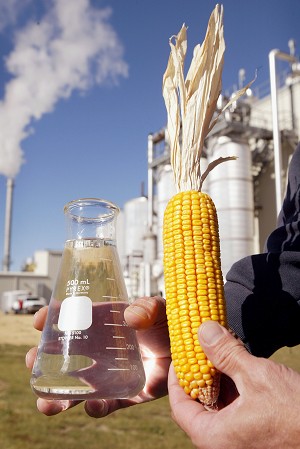[Update: While some may think this decision was a win for corn ethanol, House Ag Committee Chair Collin Peterson clearly does not. In fact, he is seriously ticked off about it. According to CongressDaily, Peterson responded to the indirect land use ruling as follows:
“You are going to kill the biofuels industry. You are in bed with the oil industry. I won’t support any climate change bill even if you fix it because I don’t trust anybody,” Peterson told administration witnesses at a House Agriculture subcommittee hearing on the renewable fuel standard’s impact on land use.
Ouch.]
The Obama administration came out big time today for biofuels. The White House is establishing a new Biofuels Interagency Working Group chaired by EPA administrator Lisa Jackson, Energy Secretary Stephen Chu and USDA chief Tom Vilsack and charged with a broad mandate to improve and commercialize advanced biofuels. In addition, the White House has released stimulus money to be administered by the Energy Department for research in advanced biofuels and, in a sop to a desperate industry, is directing Vilsack to “begin restructuring existing investments in renewable fuels as needed to preserve industry employment.”
At the same time, the EPA announced its proposed rule for a new Renewable Fuel Standard. This is where things start to get hazy. First the bad news: by 2022, up to 15 billion gallons of corn ethanol can be counted toward the RFS’s 36 billion gallon biofuel production mandate. We’re at 6 9 billion gallons of corn ethanol now and with all the havoc that has wreaked on agriculture worldwide, the concept of almost tripling that amount over the next 20-odd years is terrifying. What may yet save us is the fact that it will likely prove a simply impossible standard to meet.
And the fact that the administration’s rationale for expanding the use of biofuels continues to be the, at this point, misplaced desire “to reduce our dependence on foreign oil” is just ludicrous. To wit: Stephen Chu said “Developing the next generation of biofuels is key to our effort to end our dependence on foriegn oil and address the climate crisis.” That is, of course, precisely backwards. Addressing climate change WILL reduce our dependence on foreign oil. But simply reducing dependence on foreign oil won’t save the planet — only zeroing out our carbon emissions will do that. So energy policy in this country must be seen through that one, single lens.
There is some potential good news, however, as the EPA also announced that, as suspected, they will join California’s Air Resources Board in taking indirect land use into account when calculating a renewable fuel’s GHG emissions. And by the rule the EPA has proposed, both corn ethanol and soy biodiesel are unable to meet the new Renewable Fuels Standard. Like CARB, however, the EPA is hedging on its land use calculations and has offered other alternatives as well as opened up its proposal to public comment and “peer review” by experts. See Tom Philpott’s post for a detailed exploration of the EPA’s proposed land use calculations. It’s entirely possible that the ethanol lobby will succeed in watering down the land use calculations such that corn- and soy-based biofuels will qualify for the RFS with no changes in production style or feedstock sourcing.
It’s easy to throw up your hands and simply declare that the Obama administration has given in to the ethanol industry. Yet I was actually surprised at how little support for corn ethanol there was in the various announcements and press releases, not to mention the fact that Lisa Jackson herself explicitly observed that corn ethanol right now fails the proposed RFS. And while I’m deeply skeptical of even switchgrass as a feedstock, since anything that grows on marginal agricultural land would grow even better on prime agricultural land, I do think there are cellulosic biofuels that merit research (wood waste, garbage, etc.). Plus, let’s not forget that algal biofuels still may prove commercially viable. It’s also worth noting the very muted, though certainly positive, response from Tom Buis, CEO of ethanol lobby group Growth Energy. Buis likely noted as I did that the USDA’s influence over ethanol policy is significantly diluted by putting Jackson and Chu atop the new biofuels working group along with Vilsack. A boondoggle is harder (though not impossible) to maintain when multiple agencies have to conspire to support it.
A good day for biofuels, yes. But even after today’s announcement, corn ethanol’s future is as cloudy as ever.




